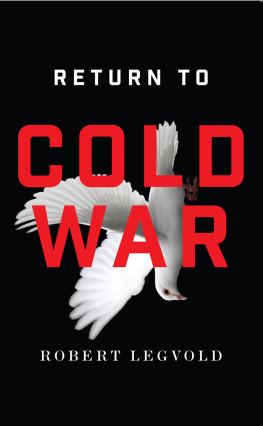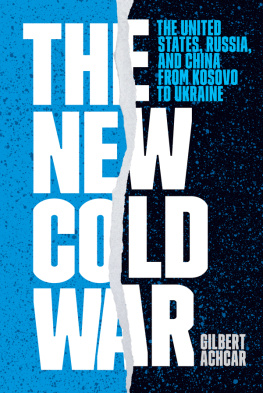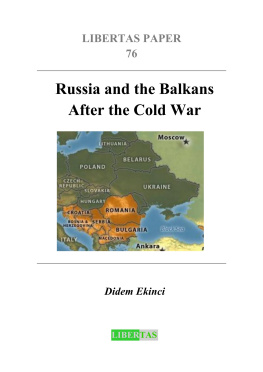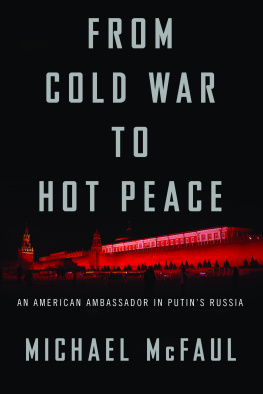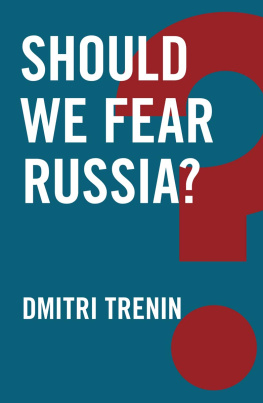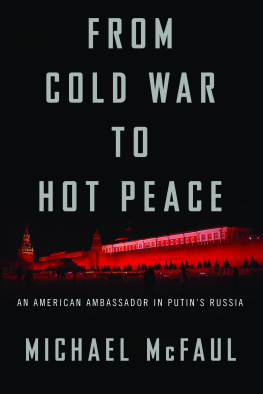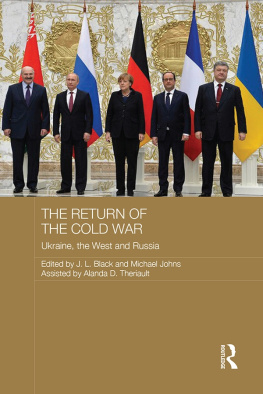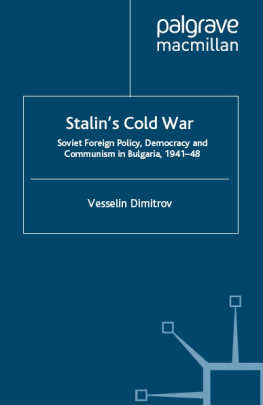Contents
Guide
Pages

To Gloria for everything
Return to Cold War
Robert Legvold
polity
Copyright Robert Legvold 2016
The right of Robert Legvold to be identified as Author of this Work has been asserted in accordance with the UK Copyright, Designs and Patents Act 1988.
First published in 2016 by Polity Press
Polity Press
65 Bridge Street
Cambridge CB2 1UR, UK
Polity Press
350 Main Street
Malden, MA 02148, USA
All rights reserved. Except for the quotation of short passages for the purpose of criticism and review, no part of this publication may be reproduced, stored in a retrieval system, or transmitted, in any form or by any means, electronic, mechanical, photocopying, recording or otherwise, without the prior permission of the publisher.
ISBN-13: 978-1-5095-0192-2
A catalogue record for this book is available from the British Library.
Names: Legvold, Robert, author.
Title: Return to Cold War / Robert Legvold.
Description: First edition. | Malden, MA : Polity, 2016. | Includes bibliographical references and index.
Identifiers: LCCN 2015035827| ISBN 9781509501885 (hardback) | ISBN 1509501886 (hardcover) | ISBN 9781509501892 (paperback)
Subjects: LCSH: United States--Foreign relations--Russia (Federation) | Russia (Federation)--Foreign relations--United States. | United States--Foreign relations--1989- | Cold War. | Security, Interntional--21st century. | BISAC: POLITICAL SCIENCE / International Relations / General.
Classification: LCC E183.8.R9 L395 2016 | DDC 327.73047--dc23 LC record available at http://lccn.loc.gov/2015035827
The publisher has used its best endeavours to ensure that the URLs for external websites referred to in this book are correct and active at the time of going to press. However, the publisher has no responsibility for the websites and can make no guarantee that a site will remain live or that the content is or will remain appropriate.
Every effort has been made to trace all copyright holders, but if any have been inadvertently overlooked the publisher will be pleased to include any necessary credits in any subsequent reprint or edition.
For further information on Polity, visit our website: politybooks.com
Acknowledgements
Usually those who bring a book to print get thanked last, but this book would not be in print were it not for Louise Knight, Polity Press senior acquisitions editor. Prompted by a piece of mine in Foreign Affairs on what I called the new Cold War, she got in touch and challenged me to justify myself at book length. She and her assistant Nekane Tanaka Galdos cheer their authors on in a way that makes working with Polity Press a pleasure. The rest of the team at the press is also remarkably efficient and effective none more than Caroline Richmond, who copyedited the manuscript. Other authors will know what it means to have an editor who with small, deft changes tightens a manuscript without altering the authors voice. Caroline has that skill down to an art. To the anonymous outside reader who came to the manuscript skeptical of its theme, but with an open mind and willing to be persuaded at least partially I am grateful for the advice, even that which I did not take.
Were I to thank all those in the United States, Europe, and Russia whose writings and conversation over the years, particularly the last two, have shaped my thinking the list would be very long. Because none with one exception has had a chance to look at and try to rescue the manuscript, I will spare them. They will know who they are from my many intrusions on their workday and the pleasant lunches and dinners we have had together. I am deeply grateful for the time they have given me, the insights they have shared, and the friends they are.
Introduction
Five years ago even two years ago I could never have imagined writing this book. Talk of a new USRussian Cold War, already in the air, seemed to me wildly exaggerated. Sure, tensions existed, and the relationship had been up and down for years. The two countries were feuding over US plans to put a missile defense system in Europe, the war in Syria, and the refuge Russia had given Edward Snowden. Vladimir Putin had run much of his 2012 re-election campaign on a crude theme of anti-Americanism. And President Obama had grown so frustrated over Russias lack of cooperation on a number of key issues that he called off the summit of the two leaders planned for September 2013.
But that the bottom would fall out, and the two countries would careen into a swirl of vituperation, hostility, and confrontation with no end in sight, caught me, and I think most observers, by surprise. True, one or two commentators had for some time insisted that a Putinled Russia was from the beginning in a new Cold War with the West. But most observers thought that either misrepresented the problem in RussiaWest relations or misunderstood the concept of cold war. Now, however, suddenly the relationship had crossed a threshold and entered an unexpected but qualitatively different phase. The useful ambiguity of previous years, when neither side was quite sure whether the other was friend or foe (but, left to hope, mostly friend) had vanished. As the angry recriminations of spokesmen on both sides made plain, they were now adversaries, convinced the other side meant to do as much harm to their country as the formers scheming would allow. Thoughts of cooperating on issues where failure to cooperate bordered on the insane, such as limiting the spread of nuclear weapons, banding together to deal with terrorism, and doing something about climate change, still echoed faintly on both sides. But anything approximating genuine cooperation on the hard issues of the day, such as coping with a Middle East in flames, ensuring that the development of the Arctics vast oil and gas reserves remained peaceful, getting a handle on the rising perils in a world of multiple nuclear powers, encouraging mutual energy security in place of increased energy competition, and responding to the rise of China and other new powers, had died at least until that awful Friday night in November in Paris.
Instead the United States, in something resembling an ersatz containment policy, declared its determination to isolate the Russian regime driving it out of the G-8, cutting off key arms control negotiations, suspending cooperation in a wide range of working groups, mobilizing allies to do the same, and, with them, applying a broad range of sanctions against Russian political and business leaders as well as key banks and energy entities. Russia lashed out with a bitter denunciation of US foreign policy and declared its willingness to live without the West characterized in any case as morally corrupt and in economic decline and political crisis. It would use the Wests hostility to develop its own human and material resources and create a more self-sufficient country. It would fashion an alternative universe of partners and allies first with its nearest neighbors in a Eurasian Economic Union and then with China and the other members of BRICS (Brazil, China, India, and South Africa). And it would not back down: having seized Crimea and fueled the war in eastern Ukraine, it meant to keep supplying the insurgents with more and better armament and doing little to bring about a stable Ukraine at peace.
Something fundamental had happened in USRussian relations, and more broadly in Russias relations with the West, but what? How was this new dark chapter to be understood, its significance assessed, and its likely course judged? As analysts groped for a label, the easy recourse too easy, because few thought hard about its actual relevance was cold war. It was shorthand for a relationship gone bad, but whether and how this really paralleled the original Cold War went unexplored. Like the word war itself, when employed as the war on poverty, a war on crime, or the war against drugs, the phrase had no conceptual content.

